-
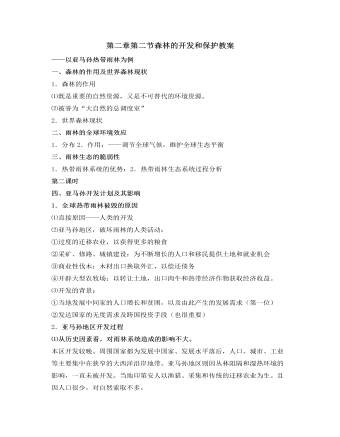
人教版高中地理必修3第二章第二节森林的开发和保护教案
活动建议:亚马孙雨林的开发和保护,一直作为一个两难问题困扰着决策者们。这三个议题的提出,为决策者们提供了思考的途径,其实这也是国际社会的呼声。活动中,可以让同学们任意选一个感兴趣的议题,进行评述、整理、发挥,然后进行交流,达成共识。或以板报的形式 进行。板书设计第二节 森林的开发和保护——以亚马孙热带雨林为例四、亚马孙开发计划及其影响1.全球热带雨林被毁的原因⑴直接原因——人类的开发⑵亚马孙地区,破坏雨林的人类活动:⑶开发的背景:2.亚马孙地区开发过程⑴从历史因素看,对雨林影响不大。⑵20世纪五六十年代后,影响逐渐加大3.亚马孙流域 大规模开发计划⑴修建亚马孙横贯公路 ⑵移民亚马孙平原⑶借助外资、鼓励跨国企业投资开发五、雨林的前途——开发还是保护1.目前,全球的热带雨林正以惊人的速度不断减少。2.亚马孙这片全球最大的热带雨林,前景也同样不容乐观。3.开发 与保护?
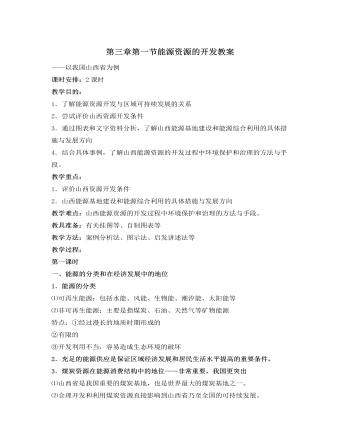
人教版高中地理必修3第三章第一节能源资源的开发教案
山西省总结出了许多重点工矿区的生态环境建设模式,即围绕煤田的露天开采区、居民点和主要交通线建设区,通过工程及生物措施,结合土地的复垦,充分利用厂矿的人力、财力和科技优势,建立集约经营的高效蔬菜、水果及肉蛋奶生产基地(图3.13)。1.说一说图中各种工程及生物措施的作用。点拨:参考图3.13图中各工程及措施的作用:(1)隔离护坝:主要作用是将采掘区与河流隔开,以免河水流入采掘区。(2)排水沟:主要作用是引开可能进入采掘区的雨水或其他水源。(3)公路紧靠采掘区,方便运输车辆就近从工地上公路。(4)“固沙草方格”,即在流沙表面用麦草、稻草扎成1×1米的草方格,使流沙不易被风 吹起,达到阻沙、固沙的目的,并在草方格上栽种沙蒿、花棒、籽蒿、拧条等沙生植物,建立起旱生植物带,营造挡沙树林。
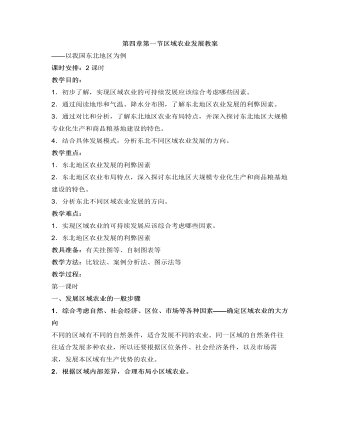
人教版高中地理必修3第四章第一节区域农业发展教案
1.根据下面的材料,归纳珠江三角洲发展基塘生产有利的地理条件。珠江三角洲地势低平,河网密布,降水充沛。北回归线从珠江三角洲的北部穿过。桑树和甘蔗主要分布于热带和亚热带。广州是古代海上丝绸之路的起始地之一。水产品在广东人的食物结构中占有较大的比重。点拨珠江三角洲地区发展基塘农业生产有利条件可以结合材料,归纳为三个方面:地形、气候、市场(当地和海外)具体分析略。2.图4.16所示的基塘生产将哪些产业联系起来?哪些副产品(或废弃物)被充分利用起来?这种联系对农村经济发展有什么作用?点拨基塘生产环节将种植业(桑、蔗等)、养殖业(养蚕、养鱼)、工业(丝厂、糖厂)等几种产业紧密的联系在一起。在此环节中,塘泥、蚕沙(蚕屎)、蚕蛹、缫丝、滤泥、蔗叶等副产品被充分的回收利用。养蚕业、蔗糖加工业同塘鱼养殖业紧密结合,作为一种综合的经营,几者之间相互依存、相互促进、扬长补短,有机地循环联系起来。
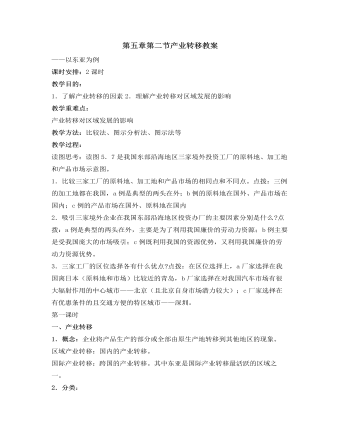
人教版高中地理必修3第五章第二节产业转移教案
1.阅读图5.16,说明产业向国外转移对日本经济的不利影响。点拨:图5.16直观的显示了产业转移对日本经济的不利影响:形成“产业转移出去的多,转移进来的少→国内生产投资不足,生产困难→市场萎缩→产业向外转移,外资不愿进入”的恶性循环。2.尽管重化工业的环境污染比较严重,但是却能为工业化的发展提供坚实的基础,因此成为发达工业的象征。日本、韩国的经济发展都经历了由轻工业(劳动密集型)到重化工业(资源密集型和资金密集型)到高科技工业(技术密集型)的阶段。(1)为什么日本、韩国在重点发展重化工业之前,要先发展劳动密集型工业?点拨:重化工业的发展一方面需要有一定的工业基础和技术工人,另一方面需要投入大量的资金,先发展劳动密集型工业有利于利用劳动力资源丰富且廉价的优势,积累资金和造就产业工人。所以,劳动力丰富的发展中国家或地区的工业化往往从优先发展劳动密集型工业开始。
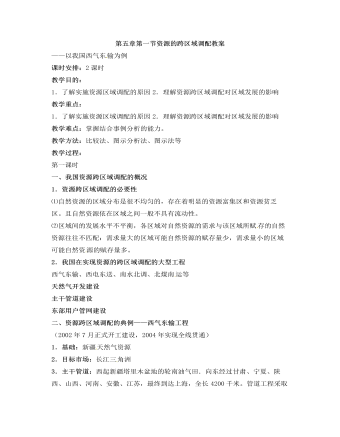
人教版高中地理必修3第五章第一节资源的跨区域调配教案
2.通过西气东输输送到上海的天然气,价格只相当于进口天然气的3/4、同等热值煤气的 2/3。你认为是否应该提高天然气的价格,以促进西部的发展。点拨:可以从不同方面分析。⑷对环境的影响①有利于改善东部地区的大气质量据监测显示,在同等热值的情况下,与煤炭相比,利用天然气作燃料几乎不产生二氧化硫、粉尘等污染物质,氮氧化物和二氧化碳的排放量也大为减少。长江三角洲地区的能源长期高度依赖煤炭,例如,上海市煤炭消费量占能源消费总量的70%。从西部地区输送来的天然气,可以部分替代煤炭。②为了最大限度减少对沿线地区生态环境的影响,西气东输工程在建设过程中,严格环境保护的要求。③在沿线农村地区推广使用天然气,可减少农民对薪柴的需求,从而缓解因植被破坏而带来的环境压力。
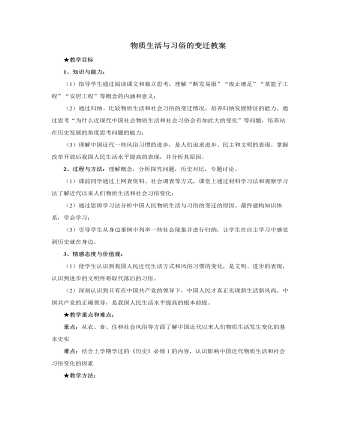
人教版高中历史必修2物质生活与习俗的变迁教案
★教学总结:(1)我国衣着服饰变化的三大阶段第一阶段(鸦片战争后到新中国的建立):这一阶段的阶段特征为中式与西式、传统和现代服饰并存男装:长袍马褂、西装、中山装 女装:旗袍(新式与旧式)第二阶段(新中国建立后到十一届三中全会):这一时期由于政治上的影响,阶段特征为衣着朴素,与革命相关的服饰成为主流男装:列宁装、中山装、绿军装女装:列宁装、布拉基、绿军装第三阶段(十一届三中全会后):阶段特征为与世界接轨,异彩纷呈;具体表现在,服饰由最基本的防寒保暖向美观大方转变,各种款式的服装层出不穷现在的服装是色彩鲜艳、款式多样,什么牛仔服、休闲服、西装、T恤衫、晚礼服,真是不胜枚举。每年服装的流行色、流行款式不断改变,大街上的姑娘和小伙子永远领导着时装新潮流。模特表演、模特广告和模特大赛已成为人们穿着方面不可缺少的内容。
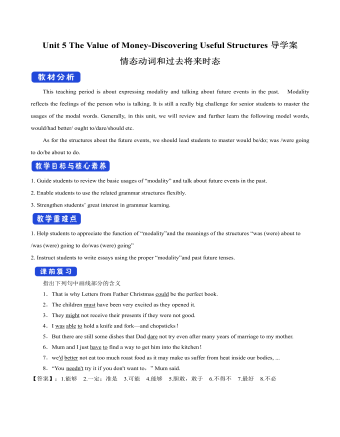
新人教版高中英语必修3Unit 5 The Value of Money-Discovering Useful Structures导学案
4.They were going to find someone to take part in their bet when they saw Henry walking on the street outside.[归纳]1.过去将来时的基本构成和用法过去将来时由“would+动词原形”构成,主要表示从过去某一时间来看将要发生的动作(尤其用于宾语从句中),还可以表示过去的动作习惯或倾向。Jeff knew he would be tired the next day.He promised that he would not open the letter until 2 o'clock.She said that she wouldn't do that again.2.表示过去将来时的其他表达法(1)was/were going to+动词原形:该结构有两个主要用法,一是表示过去的打算,二是表示在过去看来有迹象表明将要发生某事。I thought it was going to rain.(2)was/were to+动词原形:主要表示过去按计划或安排要做的事情。She said she was to get married next month.(3)was/were about to+动词原形:表示在过去看来即将要发生的动作,由于本身已含有“即将”的意味,所以不再与表示具体的将来时间状语连用。I was about to go to bed when the phone rang.(4)was/were+现在分词:表示在过去看来即将发生的动作,通常可用于该结构中的动词是come,go,leave,arrive,begin,start,stop,close,open,die,join,borrow,buy等瞬间动词。Jack said he was leaving tomorrow.
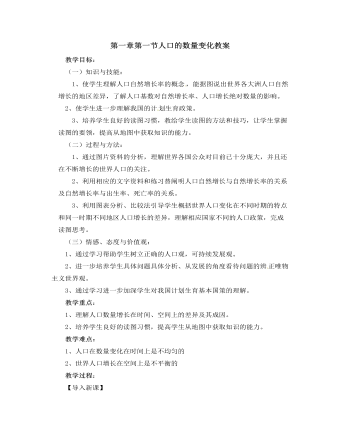
人教版新课标高中地理必修2第一章第一节人口的数量变化教案
材料四:印度提倡“只生一个好”——鼓励三人小家庭 生男生女都一样材料五:印度尼西亚《人口发展与幸福家庭法》材料六:我国基本国策 计划生育(小结)通过对以上材料的分析我们可以得出这样的结论,不同的国家应该采取不同的人口政策,对与发达国家来说人口增长缓慢,应采取鼓励生育,吸引移民的措施;发展中国家人口增长较快,实行控制人口的政策已经迫在眉睫。不论是发达国家还是发展中国家共同的目标就是实现环境人口和社会经济的协调发展。【课堂小结】这节课我们主要学习了人口的自然增长,影响人口自然增长的因素有哪些?(人口的自然增长率和人口的基数)世界人口的数量在不同的历史时期表现出不同的特征,同一历史时期的不同地区,人口数量的增长又有不同的特点。面对不同的人口形势,各国应采取不同的人口政策。
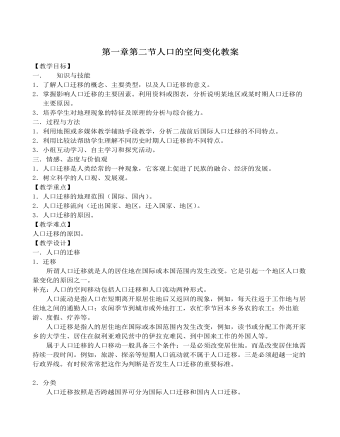
人教版新课标高中地理必修2第一章第二节人口的空间变化教案
1.促使美国成为一个移民国家的因素是:①美洲属于未开发的新大陆,需要大量的劳动力;②欧洲失业工人和破产农民增加,人们为了追求更好的经济待遇迁往美洲;③新航线的开辟为人们顺利迁移扫除了障碍;④殖民扩张是人口迁移的促进因素,加快了人口迁移的过程。导致美国人口在本土范围内频繁迁移的原因,归纳起来有:第一次人口迁移是战争因素,第二次是城市化;第三次是自然环境、经济环境的变化;第四次是经济格局的变化,即西部和南部新资源的发现和新兴工业的发展。2.我国古代的人口迁移,深受统治者及其行政力量的束缚。封建帝王为了加强本国的经济和军事实力,对人口迁移严加控制。只有当战乱发生的时候,这种控制才得到削弱,人们为了躲避战乱,寻找安定的生活环境,不得不进行大规模的迁移。我国近几十年的人口迁移主要是由生产资料和劳动力数量上的地区分布不平衡造成的,是经济因素在起主导作用,与古代的人口迁移截然不同。
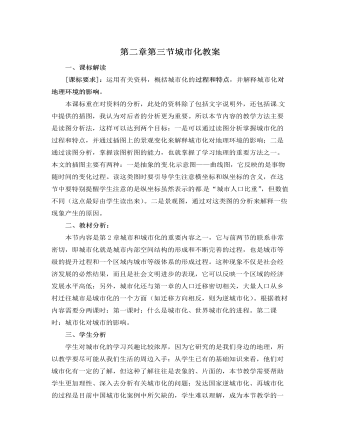
人教版新课标高中地理必修2第二章第三节城市化教案
[补充]:郑州是特大城市,我们对灯火通明的夜晚都有深刻的体会,我们都体会过光给他们带来的好处,而对过多过亮的光带来的危害则很少认真地思考过,且光污染给都市人们和其他生物和环境带来的不利影响也越来越大,所以,我在这儿给同学们补充光污染,目的是提醒他们要增强环保意识,要理解城市在建设过程中要减少城市各类活动对环境的污染;另外,随着城市的不断发展,还可能会产生新 的污染物。还培养了学生用发展的眼光来看世界。[思考]:如何降低城市化对地理环境产生的影响?[答]:发展生态城市,使人工环境和自然环境和谐统一起来。一方面在城市建设中,要发展低污染的节能建筑和绿色交通,减少城市各类活动对环境的污染;另一方面使城市景观尽可能地与山、河、湖、海、植被等自然景观保持协调,建立一种良性循环。
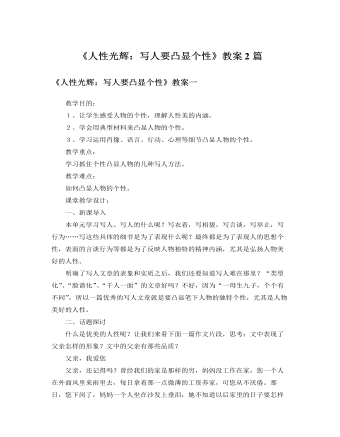
人教版高中语文必修1《人性光辉:写人要凸显个性》教案2篇
(学生展开畅叙所谈,言之有理即可。)归纳:以上因素在人物语言表达中是综合体现的,所以在写作时必须周密思考,使人物语言体现的人物性格更丰富,更有立体感。(3)行动描写矛盾先生曾说:“人物性格必须通过行动来表现。”我们在写作文时,应当注意描写最能揭示人物本身的独特性格的,最合乎人物地位,身份的动作,从而使人物形象更生动。行动描写要注意哪些方面?A、选择具有代表性,最能表现人物性格的行动来写。如《守财奴》中的老葛朗台的性格特点。B、要善于选择具有表现力的动词,把人物的行动准确传神地描写出来。(4)侧面描写写作不仅可以从正面对人物加以刻画,也可以通过周围各种不同人物的眼看,嘴讲等方式,从侧面起到烘托某个特定人物的作用。(请学生欣赏片段《茶花女》,《红楼梦》,教师归纳。)
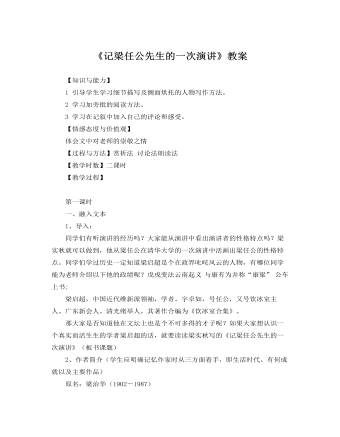
人教版高中语文必修1《记梁任公先生的一次演讲》教案
三、教师总结:在那如火如荼的苦难岁月,梁任公的政治主张屡屡因时而变,但为人处世的原则始终未变,他不是冯自由等人所描述的那种变色龙。他重感情,轻名利,严于律己,坦诚待人。无论是做儿子、做丈夫、做学生,还是做父亲、做师长、做同事,他都能营造一个磁场,亮出一道风景。明镜似水,善解人意是他的常态,在某些关键时刻,则以大手笔写实爱的海洋,让海洋为宽容而定格,人间为之增色。我敢断言,在风云际会和星光灿烂的中国近代人才群体中,特别是在遐迩有知的重量级历史人物中,能在做人的问题上与梁启超比试者是不大容易找到的。四、课后作业:找出文中细节及侧面描写的地方,想一想这样写有什么好处,总结本文的写作特点。五、板书设计:梁任公演讲特点:
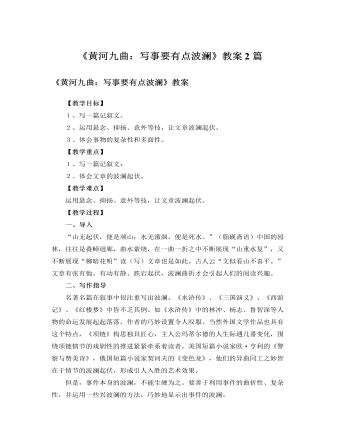
人教版高中语文必修1《黄河九曲:写事要有点波澜》教案2篇
1.悬念法悬念法又称关子。它是作者为了激发那种“紧张与期待的心理活动”,在行文中有意采取的一种积极而有效的手段。这种手段包括“设悬”和“解悬”两方面。所谓 “设悬”就是设置悬念,即在情节发生发展的关键时刻或人物命运攸关的重要关头,叙述戛然而止,转叙他事。从而引起读者强烈的寻根问底的兴趣。所谓“解悬” 也叫“释悬”,就是指在情节发展的特定阶段,通过矛盾的解决,揭示事情原委和人物命运的结局,使读者的期待心理得以满足。如《驿路梨花》,当人们正为露宿而发愁时出现了一间神秘的小屋,小屋的主人是谁呢?猜想间,有人来了,但也不是屋子主人,那小屋子的主人是谁呢?终于知道了小屋是解放军盖的,但为什么要盖这间小屋呢?这样“设悬——释悬——带出新悬念”,环环相扣、层层递进,使文章韵味无穷。
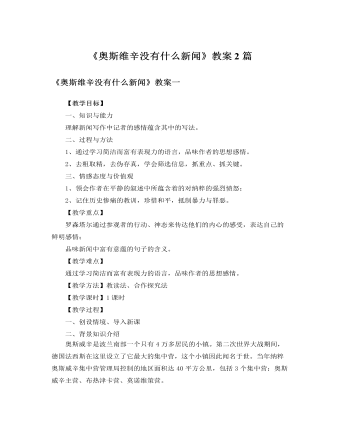
人教版高中语文必修1《奥斯维辛没有什么新闻》教案2篇
3.作者为什么不直接描写人们看见东西呢?请同学们找出其中的细节描写,并说明有什么表达效果。答:侧面烘托,正是作者高明之处,这也是许多佳作常用之法。细节描写往往会成为事情的切入点和突破口,一篇佳作往往离不开一些细节描写,本文也不例外,有些细节描写耐人寻味,如:“德国人撤退时炸毁的布热金卡毒气室和焚尸炉废墟上,雏菊花在怒放。”“这是一个二十多岁的姑娘,长得丰满,可爱,皮肤细白,金发碧眼。她在温和地微笑着,似乎是为着一个美好而又隐秘的梦想而微笑。”4.句子赏析:“对另外一些人来说,这样一个事实使他们终生难忘:在德国人撤退时炸毁的布热金卡毒气室和焚尸炉废墟上,雏菊花在怒放。”明确:一边是戕害生命的毒气室和焚尸炉,一边是生机勃勃的生命,两种反差极大的事物摆在一起。表达了作者对纳粹的讽刺:纳粹的残暴终归阻止不了生命的进程。同时也表达了作者的控诉:生命的绽放是人世间最美好的事情,对生命的戕害是最恶劣的罪行。
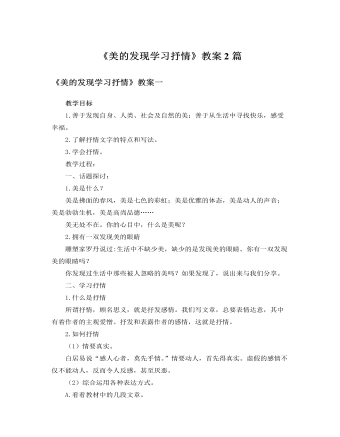
人教版高中语文必修2《美的发现学习抒情》教案2篇
写作指导:第一题要求写出自然美,在自然美中融进自己的感情。小路、流水、山峦、森林、天空、大海……都是实体事物,因此首先要求用写生的办法把它们表现出来,要写得准确,写出它们的特点和个性,尤其是写出它们的美。同时,也要把赞美之情不落痕迹地融化在描写之中。第二题是写一幅风景画或一张风景照片中的自然美景,以及美景中的一些细节,同时把自己心动的感觉写出来。在这里,关键是找到画或照片中的美,找到心动的感觉,如果找到了,再用文字把这美和感觉表达出来。当然,写风景美和写自己的感觉应是乳水交融的。第三题是用动情的笔墨把自己的一种经历写出来。这些经历似乎都是细节,都不是惊天动地的大事。是细节,就容易碰到,在题目列举的四种中,学生不难找到。即使不在这四种中,也可以,只要这种经历给了自己心灵以震撼或潜移默化的影响。
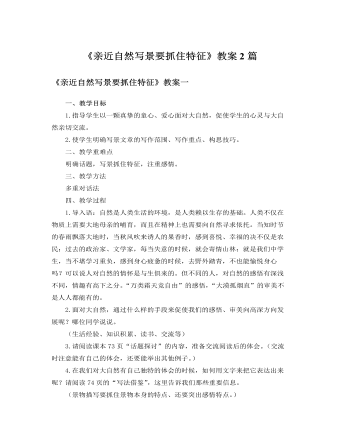
人教版高中语文必修2《亲近自然写景要抓住特征》教案2篇
一、教学目标1.指导学生以一颗真挚的童心、爱心面对大自然,促使学生的心灵与大自然亲切交流。2.使学生明确写景文章的写作范围、写作重点、构思技巧。二、教学重难点明确话题,写景抓住特征,注重感情。三、教学方法多重对话法四、教学过程1.导入语:自然是人类生活的环境,是人类赖以生存的基础。人类不仅在物质上需要大地母亲的哺育,而且在精神上也需要向自然寻求依托。当知时节的春雨飘落大地时,当秋风吹来诱人的果香时,感到喜悦、幸福的决不仅是农民;过去的政治家、文学家,每当失意的时候,就会寄情山林;就是我们中学生,当不堪学习重负,感到身心疲惫的时候,去野外踏青,不也能愉悦身心吗?可以说人对自然的情怀是与生俱来的。但不同的人,对自然的感悟有深浅不同,情趣有高下之分。“万类霜天竞自由”的感悟,“大漠孤烟直”的审美不是人人都能有的。2.面对大自然,通过什么样的手段来促使我们的感悟、审美向高深方向发展呢?哪位同学说说。
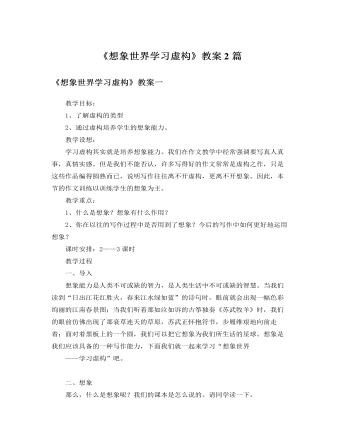
人教版高中语文必修2《想象世界学习虚构》教案2篇
虚构不等于说假话。它是一种源于生活,但高于生活的艺术真实。我们可以举个例子:我国公认的最权威最真实的史书是——《史记》,那么,大家认为《史记》里有没有虚构呢?有。必修一的《鸿门宴》里就有虚构。大家想:司马迁是哪个朝代的人?西汉汉武帝时。刘邦项羽是哪个朝代的?秦末时期。那司马迁不可能坐时光穿梭机到秦末去参加鸿门宴吧?既然他没不在场,那课文《鸿门宴》里人物的语言、动作、甚至是表情从何而来呢?对,是司马迁根据有限的史料加以补充,想象、虚构出来的。那么,同学们在写作文时,也可以不必拘泥于亲身经历的事情,毕竟生活是平淡的,毕竟大家的生活阅历也有限,有时候,我们发挥想象、虚构一个故事来反映生活的真实,也许更生动、也更典型。所以,近年来高考试卷中都提示考生:作文可以大胆想象,编写故事。按照编故事的方式不同,我们的虚构性作文又可以写哪些类型呢:小说,散文,童话,寓言,科幻,故事新编……
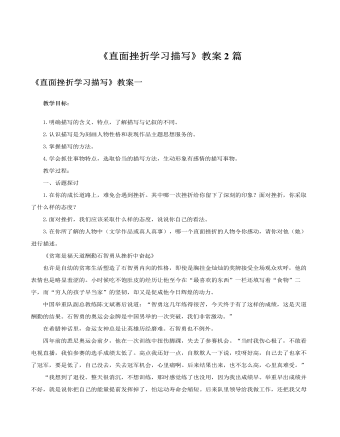
人教版高中语文必修2《直面挫折学习描写》教案2篇
《贫寒是福天道酬勤石智勇从挫折中奋起》也许是自幼的贫寒生活塑造了石智勇内向的性格,即使是胸挂金灿灿的奖牌接受全场观众欢呼,他的表情也是略显羞涩的。小时候吃不饱肚皮的经历让他至今在“最喜欢的东西”一栏还填写着“食物”二字,而“穷人的孩子早当家”的坚韧,却又是促成他今日辉煌的动力。中国举重队副总教练陈文斌赛后说道:“智勇这几年练得很苦,今天终于有了这样的成绩,这是天道酬勤的结果。石智勇的奥运会金牌是中国男举的一次突破,我们非常激动。”在希腊神话里,命运女神总是让英雄历经磨难。石智勇也不例外。四年前的悉尼奥运会前夕,他在一次训练中扭伤脚踝,失去了参赛机会。“当时我伤心极了,不敢看电视直播,我怕参赛的选手成绩太低了。高点我还好一点,自欺欺人一下说,哎呀好高,自己去了也拿不了冠军,要是低了,自己没去,失去冠军机会,心里痛啊。后来结果出来,也不怎么高,心里真难受。”
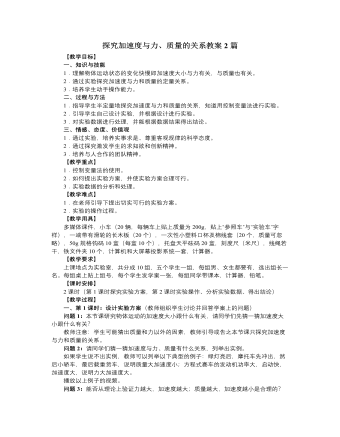
人教版新课标高中物理必修1探究加速度与力、质量的关系教案2篇
三、制定实验方案的两个问题:1.怎样测量(或比较)物体的加速度:引导学生思考、讨论并交流。学生可能会提出下面的一些方案:方法一:测出初速度为零的匀加速直线运动的物体在 时间内的位移 ,则 ;方法二:在运动的物体上安装一条打点计时器的纸带,根据纸带上打出的点来测量加速度;方法三:测出两个初速度为零的匀加速运动的物体在相同的时间内发生的位移 、 ,则 ;方法四:测出两个初速度为零的匀加速运动的物体在相同的位移内所用的时间 、 ,则 ;2.怎样提供并测量物体所受的恒力:教师提出:现实中,除了在真空中抛出或落下的物体(仅受重力)外,仅受一个力的物体几乎是不存在的。然而,一个单独的力作用效果与跟它大小、方向都相同的合力的作用效果是相同的,因此,实验中力 的含义指物体所受的合力。以在水平轨道上用绳牵引小车加速运动为例,小车受到四个力的作用,即重力、支持力、绳的拉力和轨道对小车的摩擦力(当物体运动的速度比较小时,我们可以忽略空气的阻力)。
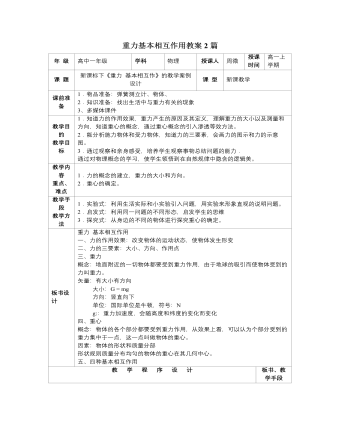
人教版新课标高中物理必修1重力基本相互作用教案2篇
具体过程:先用悬挂法确定重心之后,在板上固定一条细线ab,让ab穿过重心c点,再在其重心c处拴上细绳提拉,验证薄板可以水平平衡.如图3-1-6、3-1-7所示.归纳:物体的重心可在物体之上,也可在物体之外.结论:规则均匀的物体重心在其几何中心;不规则不均匀的物体重心用悬挂法.例3一个被吊着的均匀的球壳,其内部注满了水,在球的底部有一带阀门的细出水口.在打开阀门让水慢慢流出的过程中,球壳与其中的水的共同重心将会()A.一直下降B.一直不变C.先下降后上升D.先上升后下降先让学生自己回答,估计很多学生会选择A;教师提示开始和最终重心的位置,学生很快就能得出正确答案.借机引导学生思考问题要全面.参考答案:在注满水时,球壳和水的共同重心在球心,随着水的流出,球壳的重心不变,但是水的重心下降,二者共同的重心在下降.当水流完时,重心又回到球心,故选项C正确.





















